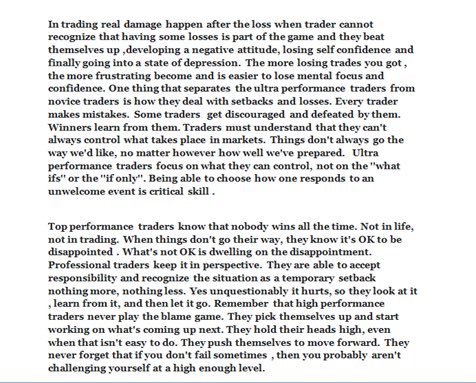
Brandt uses high/low/close bar charts as his primary trading (not, he stresses, forecasting) tools. He is for the most part a longer-term discretionary pattern trader who enters on breakouts that meet his stringent requirements. Since he knows that only 30 to 35% of his trades will be profitable over an extended period of time and up to 80% will be unprofitable over a shorter time frame, he is exceedingly cautious about leverage. For instance, his trading assets committed to margin requirements rarely exceed 15%.
In the first two parts of the book Brandt offers the reader a thorough course in identifying and categorizing trading signals, placing initial protective stops and subsequent trailing stops, pyramiding, and taking profits. The course addresses traders at all skill levels. For instance, he describes his own trading plan as simple, but some of its elements require a degree of judgment and sophistication that can only come with extensive practice. One example: “time phasing is a hurdle all traders must clear in order to be consistently successful.” (p. 88)
The third part of the book is Brandt’s five-month trading diary, and it’s a fascinating read. Not only does it describe individual trades but it shows how good traders evolve. Take month four, where the author is in a drawdown period. He writes that he has always known that there were flaws in his trading plan but that “good times provide cover for the deficiencies of a trading plan.” During tough times “markets have a way of exploiting flaws in a trading plan. … The challenge is to find the fundamental flaws, not just to make changes that would have optimized trading during the drawdown phase. … Almost always the changes [the author has made to his own plan] have dealt with trade and risk management, not with trade identification.” (p. 189) (more…)


 Art is for the Artist. Words must be written, Songs must be sung. Visions must be seen. Not because they are valued; but because they are Ideas. The Artist understands that wealth, true wealth as opposed to simply being rich, stems from Ideas. Great Art is valued, if valued properly, because they express an Idea well. Not always because they express a grand idea.
Art is for the Artist. Words must be written, Songs must be sung. Visions must be seen. Not because they are valued; but because they are Ideas. The Artist understands that wealth, true wealth as opposed to simply being rich, stems from Ideas. Great Art is valued, if valued properly, because they express an Idea well. Not always because they express a grand idea.

 “The most risk is always going to be in the areas that had the biggest moves up already, and everybody’s talking about ‘em, and then you get sucked in at the most inopportune time — and then you don’t know what hit you.
“The most risk is always going to be in the areas that had the biggest moves up already, and everybody’s talking about ‘em, and then you get sucked in at the most inopportune time — and then you don’t know what hit you.